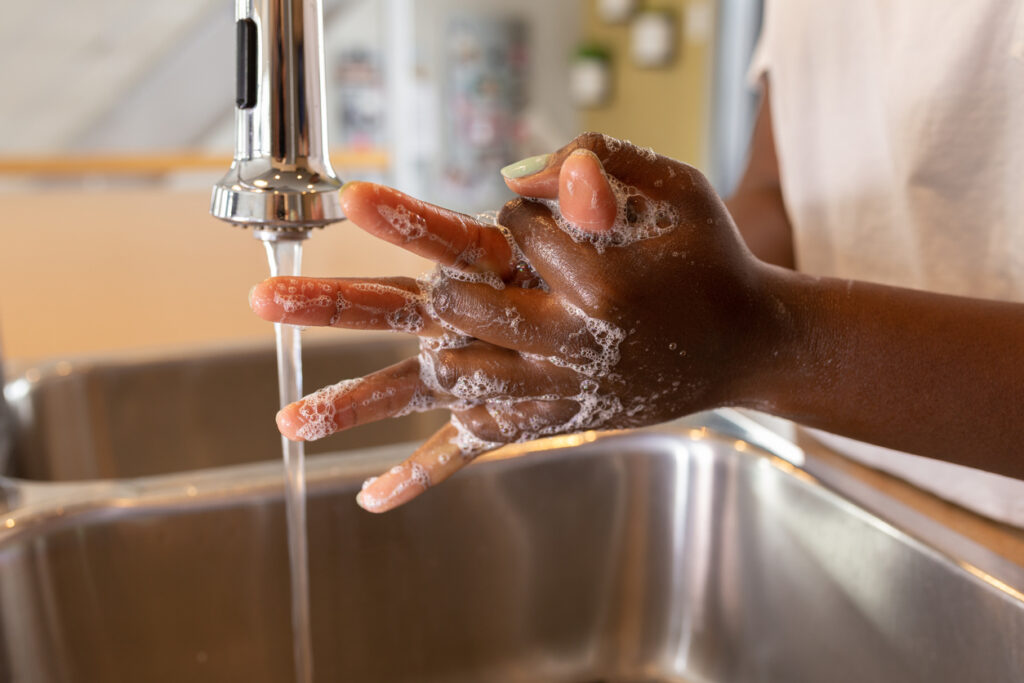Want to get rid of Cornovirus, then set aside your antibacterial soaps and hand sanitizers and return to a good old-fashioned bar of soap. This seems counter-intuitive, but let’s examine this a little closer. Antibacterial soaps are made to fight bacteria. We are dealing with a virus, so antibacterial soap is not the correct weapon. Hand sanitizers are good when hand washing is not an option—more on that later. Your best weapon during this pandemic is a bar of soap and good handwashing technique.
Why Wash?
Washing your hands with a bar of soap unleashes “soap molecules” (yes, that’s the official term) that have a hydrophobic (water-hating, or water-fearing) end and a hydrophilic (water-loving) end. When mixed with water, the components of a soap molecule line up so that the water-loving ends are facing out, and the water-hating ends are facing in. The hydrophilic ends attach to the proteins & lipids coating the Coronavirus (for example) and dissolve them. This prevents the virus from entering your skin, and ultimately washes the virus down the drain. Be sure to wash for at least 20 seconds, because you need time and firm hand motions to break down the virus. Use warm water when washing. The warm water doesn’t kill the virus—you’d need scalding hot water to do that. Warm water will help you achieve lots of suds, which will allow the soap molecules to break down the virus.
The next step is just as important—dry your hands. Use disposable paper towels, or single use cloth towels. Keeping hands dry is a key step to preventing the spread of the virus, and the extra friction of towel hand drying serves to remove any remaining dirt or pathogens. Air dryers merely serve to spread germs throughout the bathroom, so avoid those whenever possible.
What role do hand sanitizers play?
Hand sanitizers do play an important role in the spread of the virus but should only be used when soap and water are not available. They should be at least 60% alcohol, according to the CDC. The alcohol will kill the virus when it encounters the virus. That means vigorous and hand rubbing all over your hands and between your fingers is important. It’s necessary to let the sanitizer dry before touching anything since dry hands are less enticing for the virus to cling to. The problem with sanitizers is that they do not do a lot to clean hands that have grease, dirt or sticky substances—soap and water do that best. If someone sneezes mucus onto your hand (yes, so gross!) soap and water is what you want to reach for, if possible.
Products
A lot of studies point to low rates of cardiovascular disease for cultures that use MCT oils, like India, the Philippines, and Polynesia. But rarely is just one food item responsible for their great heath. According to Harvard’s TH Chan Medical School, “it is important to note that many other characteristics, dietary and other, could be explanatory. Also, the type of coconut products they eat are different from those in a typical Western diet. These groups do not [simply] eat processed coconut oil, but the whole coconut. They use coconut meat or pressed coconut cream, along with an indigenous diet of foods rich in fiber and low in processed and sugary foods.”
As far as finding chemical-free soap and sanitizers your best bet is to search the Environmental Working Group (EWG) website for their bar soap recommendations and their sanitizer recommendations.
Also watch this helpful video from cooking expert Alton Brown on the best handwashing method around. Stay clean and healthy!







